The story here:
And some brilliant commentary:
Pinto2355 [10:39 A.M.]: saddam is too crazy to even know what a death sentence is
Stannard67 [10:39 A.M.]: oh I think he knows...he's requested to be shot rather than hanged
Pinto2355 [10:40 A.M.]: he should request better ways, drawn and quartered, drowned, crucified
Stannard67 [10:40 A.M.]: crucified. definitely
Tuesday, December 26, 2006
Thursday, December 21, 2006
Eating the Heart of the Rabbit...new euphemism?
A very surreal picture of the U.S. occupation of Iraq and the actual symbols deployed in the symbolism, from Reuters:
and of course, behind the symbolism:
Iraqi soldiers bit the heads off frogs and ate the heart of a rabbit as signs of courage on Wednesday at a ceremony to transfer Najaf province, home to one of Shi'ite Islam's holiest shrines, from U.S. to Iraqi control...Politicians, tribal and religious leaders and soldiers watched displays of military prowess and one demonstration, hailed as a display of courage, in which five soldiers stopped before the grandstand to bite the heads off frogs. A sixth holding a live rabbit slit open its stomach and ate its heart before tossing the carcass to his comrades to chew on. Under Saddam Hussein's rule, his feared Fedayeen militia carried out similar
acts, and in one instance were videoed hunting a fox and then tearing it
apart with their teeth.
and of course, behind the symbolism:
Troops paraded round in shining new vehicles...but Iraq's Deputy Chief of Staff...conceded there were problems with procuring equipment and setting up supply lines, for which the Iraqi forces still depend largely on U.S. support. One soldier, Corporal Ali Abdul Hasan, said the army needed everything from helicopters to guns. "Some vehicles arrived with parts missing and we have old weapons. They didn't even give us pistols," he said.
Debate and Personal Agency
I haven't posted here about debate in a long time. But my commitment to particular processes of argument informs my life politics in so many ways. And I'm in the middle of another debate about debate: particularly the value of "switching" sides, or occasionally/frequently advocating things with which one disagrees as a competitive AND pedagogical tool. I say it's acceptable, good, ethical, to take positions with which you personally disagree. Others say not. My position is Levinasian and Habermasian, or in plain English, my position has to do with how we engage other people, and make fair rules to do so. We should step into the other's shoes. We should, in a "game" like debate, occasionally be required (or at least strongly encouraged) to do so.
Below is my latest post on this discussion, the entirety of which can be found here, on the thread entitled "criticisms." The actual discussion of agency, ethics, etc. begins around page six.
--------------------------------------------
While contemplating the fact that nobody has answered the debater/judge advocacy question (if we can't expect debaters to take up advocacies they don't endorse personally, why should we expect judges to dispell their personal beliefs as a reason for decision?--a question whose answer might reveal a lot about people's differing conceptions of debate's educational and political purpose...), I have come up with a set of questions, inspired by the last several posts on this thread. Anyone can answer them, or nobody needs to, or whatever, I am really just thinking out loud and trying to be transparent about my thought process.
1. Regarding taking positions one personally disagrees with, is there a threshold to this expectation? Must we be willing to expect "racism good" along with "U.S. hegemony good?" The dilemma is that making a distinction seems political in itself, but not making a distinction allows scenarios at least as plausible as Joey's "rape good" scenario, or even more realistically, Nomad's question of whether a Palestinian student ought to be expected to defend Israel in a debate.
To the latter question, I can only answer what seems irrefutably obvious to me: Israelis AND Palestinians ought to meet together and take EACH OTHER's sides in debates. Does anyone really think this would be a bad idea?
2. Should this decision be left up to the debaters? In a very significant way, it already is. Debaters can win the debate that their personal conviction, or the ideology it represents, is a reason to transcend normal resolutional and ground expectations. What is more important to me is that they must do this according to a set of rules that are relatively ideologically neutral: they must take turns to speak, speak within time limits, and, in 99% of the debates, ANSWER each others' arguments. These constraints serve the same deliberative function as "switching" (debating in and out of your personal agency) but the latter has the additional ethical benefit of exposure to the positive side of oppositional ideas. I believe that at the point that debaters learn to transcend the reasons why they "can't" debate from personal conviction, their level of understanding of the debate process has come close to meeting the same level of benefits that radical immersion in "switch" debate might provide.
In the larger sense of the question: I object to games where people get to do whatever they want, but I also believe that UNREFLECTIVE evasion of taking the other side guts a huge part of what is ethically (and intellectually) beneficial about debate.
3. Does the ethical transformation argument unwittingly rely on a dramatistic view of advocacy, in that I might be playing a role I don't like if I argue something I don't believe in?
I ask this because of what people say about roleplaying. I'm not sure where I am going with this question, but it seems interesting. I was in theater in high school and a tiny bit in college. I played a lot of characters I didn't like or agree with, and I think I learned something "internal" about them. Having long held that debate is argumentative oral interpretation, it seems to me that hypothetical enactment has a similar pedagogical effect as that of theater.
4. Habermas readily uses the term "universalization" to describe his ideal deliberative conclusion about norms. He genuinely believes we can build universals (although in a way very different from what Kant or metaphysical ethicists believe--he believes they can be built through democratic institutionalization). Does my description of ethical debate also imply the possibility of universals?
5. Does Nomad's hypersimulation argument undermine the ethical value of traditional debate? Depends, first, whether the argument is sound. I don't necessarily believe that the world, and rhetorical acts within the world, function the way his authors believe it does (more detail on that, obviously, to follow).
Below is my latest post on this discussion, the entirety of which can be found here, on the thread entitled "criticisms." The actual discussion of agency, ethics, etc. begins around page six.
--------------------------------------------
While contemplating the fact that nobody has answered the debater/judge advocacy question (if we can't expect debaters to take up advocacies they don't endorse personally, why should we expect judges to dispell their personal beliefs as a reason for decision?--a question whose answer might reveal a lot about people's differing conceptions of debate's educational and political purpose...), I have come up with a set of questions, inspired by the last several posts on this thread. Anyone can answer them, or nobody needs to, or whatever, I am really just thinking out loud and trying to be transparent about my thought process.
1. Regarding taking positions one personally disagrees with, is there a threshold to this expectation? Must we be willing to expect "racism good" along with "U.S. hegemony good?" The dilemma is that making a distinction seems political in itself, but not making a distinction allows scenarios at least as plausible as Joey's "rape good" scenario, or even more realistically, Nomad's question of whether a Palestinian student ought to be expected to defend Israel in a debate.
To the latter question, I can only answer what seems irrefutably obvious to me: Israelis AND Palestinians ought to meet together and take EACH OTHER's sides in debates. Does anyone really think this would be a bad idea?
2. Should this decision be left up to the debaters? In a very significant way, it already is. Debaters can win the debate that their personal conviction, or the ideology it represents, is a reason to transcend normal resolutional and ground expectations. What is more important to me is that they must do this according to a set of rules that are relatively ideologically neutral: they must take turns to speak, speak within time limits, and, in 99% of the debates, ANSWER each others' arguments. These constraints serve the same deliberative function as "switching" (debating in and out of your personal agency) but the latter has the additional ethical benefit of exposure to the positive side of oppositional ideas. I believe that at the point that debaters learn to transcend the reasons why they "can't" debate from personal conviction, their level of understanding of the debate process has come close to meeting the same level of benefits that radical immersion in "switch" debate might provide.
In the larger sense of the question: I object to games where people get to do whatever they want, but I also believe that UNREFLECTIVE evasion of taking the other side guts a huge part of what is ethically (and intellectually) beneficial about debate.
3. Does the ethical transformation argument unwittingly rely on a dramatistic view of advocacy, in that I might be playing a role I don't like if I argue something I don't believe in?
I ask this because of what people say about roleplaying. I'm not sure where I am going with this question, but it seems interesting. I was in theater in high school and a tiny bit in college. I played a lot of characters I didn't like or agree with, and I think I learned something "internal" about them. Having long held that debate is argumentative oral interpretation, it seems to me that hypothetical enactment has a similar pedagogical effect as that of theater.
4. Habermas readily uses the term "universalization" to describe his ideal deliberative conclusion about norms. He genuinely believes we can build universals (although in a way very different from what Kant or metaphysical ethicists believe--he believes they can be built through democratic institutionalization). Does my description of ethical debate also imply the possibility of universals?
5. Does Nomad's hypersimulation argument undermine the ethical value of traditional debate? Depends, first, whether the argument is sound. I don't necessarily believe that the world, and rhetorical acts within the world, function the way his authors believe it does (more detail on that, obviously, to follow).
Wednesday, December 13, 2006
Bush will move to the right on Iraq
...with a free pass. He has ignored the main recommendations of the B-H commission (the administration's latest line is that they "embrace the work of the commission" not the recommendations). He is meeting with the Joint Chiefs today; whatever they say, he's likely to spin it to suit his needs. He will do what McCain wants and increase troops. The Democrats are going to roll over. They already are.
Saturday, December 09, 2006
Did Bush Win by Losing?
By absolutely screwing the pooch in every single way, from inception to justification to execution, Bush has, perhaps inadvertently, won the domestic struggle over Iraq. In the past week he has successfully turned hardcore conservatives against a panel that included both James Baker and Al Simpson. Without lifting but a finger, he has re-mobilized the Iraq hawks (is that a term we've ever even used? If so, only for a short time...) and forced the "opposition" to fall in line behind the need to "finish the job" in Iraq.
Pragmatists find this turn of events desirable on the grounds that it's better to get out of the quagmire than place the head of its maker on a pike. Because of this, centrists will likely give Bush a free pass for a while, and cheer on the cheerleaders, and even agree with John McCain, who seems to be saying (more articulately, naturally) the same thing as the Bush White House.
Such momentum tends to take on a life of its own in this spectacle. Talking heads will call Bush's upcoming speech a success. Factions of the ruling class will compete as if they were in an essay contest..."How to Win in Iraq and Redeem American Power." Baker, Hamilton, Simpson, O'Connor and others have fallen on phantom swords to obscure real ones.
Pragmatists find this turn of events desirable on the grounds that it's better to get out of the quagmire than place the head of its maker on a pike. Because of this, centrists will likely give Bush a free pass for a while, and cheer on the cheerleaders, and even agree with John McCain, who seems to be saying (more articulately, naturally) the same thing as the Bush White House.
Such momentum tends to take on a life of its own in this spectacle. Talking heads will call Bush's upcoming speech a success. Factions of the ruling class will compete as if they were in an essay contest..."How to Win in Iraq and Redeem American Power." Baker, Hamilton, Simpson, O'Connor and others have fallen on phantom swords to obscure real ones.
Monday, November 06, 2006
"Just Tell Them The Truth"
"Ninety percent [are] going to be putting their lives on the line for our country," she said. "Tell them the truth. That's all. Just tell them the truth."
Sue Niederer, mother of Seth Niederer; Seth was killed by a roadside bomb in Iraq. Sue is commenting on the lies of Army recruiters. ABC/WABC found evidence of widespread lying on the part of recruiters in the east.
Sue Niederer, mother of Seth Niederer; Seth was killed by a roadside bomb in Iraq. Sue is commenting on the lies of Army recruiters. ABC/WABC found evidence of widespread lying on the part of recruiters in the east.
Wednesday, October 18, 2006
Dems: Don't count your chickens before they hatch...
I have long believed that projections of Democrats taking back control of congress are shortsighted and ovely optimistic. I'd even be willing to bet someone a beer that they won't even take back control of the House. If I am wrong, I'll publicly humiliate myself. But I ate a lot of steak dinners after the 2004 election, bought for me by blind-faith optimist Democrats who thought that Bush sucking was reason enough that Kerry would win.
Others will have their own explanation for the Democrats' ultimate failure. In my opinion, it's because they are INCAPABLE of having a distinct and different message, apart from empty negativity, because they are beholden to the same corrupt interests as Republicans. I would also not rule out the by-now usual litany of voting irregularities (which, because they are as corrupt as Republicans, the Democrats are unable or unwilling to address).
This post from The Hotline feeds my suspicion that a lot of you are going to be surprised, disappointed, and embarassed on election night:
Others will have their own explanation for the Democrats' ultimate failure. In my opinion, it's because they are INCAPABLE of having a distinct and different message, apart from empty negativity, because they are beholden to the same corrupt interests as Republicans. I would also not rule out the by-now usual litany of voting irregularities (which, because they are as corrupt as Republicans, the Democrats are unable or unwilling to address).
This post from The Hotline feeds my suspicion that a lot of you are going to be surprised, disappointed, and embarassed on election night:
Why The White House Has To Be Optimistic
"Perhaps the biggest danger to Republicans in the wake of all these bad polls is that their volunteer base, so critical to victory in 2004, won't put their heart in their work. If volunteers become convinced that Republicans will lose control of Congress, what incentive do they have to work hard?
"If you're ever read a profile of Ken Mehlman, you know he is obsessed with metrics. For him, one of the most important sources of data is a weekly e-mail his political team prepares called the "Weekly Grassroots Report." It meticulously records the work of tens of thousands of volunteers in targeted states, counties and congressional districts across the country. The data summary allows the RNC to determine which states are meeting goals and which states are falling behind.
"The RNC declined to share the most recent report, which was issued Monday. But two independent sources who saw last week's report professed to be surprised: not only was their [sic] no drop off last week, 12 states broke new voter contact records.
"In a month, the party completed more than a million phone calls and door contacts conbined. Bigger states are putting up big numbers -- even Ohio, which lagged behind its targets all summer, has caught up. The RNC is particularly pleased with their progress in New Jersey, where they've rapidly set up a more aggressive version of their 72 Hour Program in light of the state's more competitive Senate race.
"These are the numbers that motivate Karl Rove's optimism. The spreadsheets show that Republican volunteers are working hard. There are plenty of volunteers and they seem plenty willing to knock on doors and make telephone calls. That's why it makes sense for Rove, for White House pol. dir Sara Taylor, and for Mehlman to exude uncanny optimism even while their brains pour over pessimistic polls. Right now, a strong volunteer corps on election day working to turn out voters is the only hope they've got. If the volunteers detect a shred of defeatist cross-talk or come across a newspaper article suggesting that Rove is panicked, then they'll start to panic, too.
"The point is that top-level Republican optimism is pragmatic, not ignorant. [MARC AMBINDER]"
Tuesday, October 03, 2006
Yet another thing I could not have said better myself:
There has been a great ballyhoo about the immigration, "disasterous" cultural consequences, etc., through immigration and propagation of the paranoia that whites are going to become minority in their "own" countries. This is the narrowest-ever medieval psyche ruling the minds in the twenty-first century.
Americans, Europeans, Muslims, Hindus, in a word everyone belongs to one or the other minority group. There is only one majority in the world: that is the working-class. All others are minorities.
Capitalism and imperialism are far ahead of this medieval nonsense of countires, status-quo of cultures, etc. They need cheap labor and they draw it from all over the world; they need soldiers and recruit them from all parts of the world--making no discrimination in the process. But our enlightened leftists are backward, and they are doomed to remain so as long as they continue to seek guidance from feudal and pre-feudal sociologists and anthropologists.
Workers have no country, no motherland, no nationality, no national culture and other phantoms to worship and lay their lives for. They have their own world culture--their task is to grow from minority to majority world-wide. They are internationalists. The culture for them is not a fossil worth to be presereved but a dynamic, living thing. They have yet to proclaim their culture.
Ramesh Bhat
Americans, Europeans, Muslims, Hindus, in a word everyone belongs to one or the other minority group. There is only one majority in the world: that is the working-class. All others are minorities.
Capitalism and imperialism are far ahead of this medieval nonsense of countires, status-quo of cultures, etc. They need cheap labor and they draw it from all over the world; they need soldiers and recruit them from all parts of the world--making no discrimination in the process. But our enlightened leftists are backward, and they are doomed to remain so as long as they continue to seek guidance from feudal and pre-feudal sociologists and anthropologists.
Workers have no country, no motherland, no nationality, no national culture and other phantoms to worship and lay their lives for. They have their own world culture--their task is to grow from minority to majority world-wide. They are internationalists. The culture for them is not a fossil worth to be presereved but a dynamic, living thing. They have yet to proclaim their culture.
Ramesh Bhat
Tuesday, September 26, 2006
Debate Folks at William Jewell College

William Jewell Hall, across a beautiful quad.

You've got to hand it to Colorado College for getting to finals at the tournament...

I mean, just look at their coach!

Kevin Garner has perfected a spot-on Bush impersonation. I just hope his Republican zombie-friends don't find out about it...

I never knew Fife had a sister!
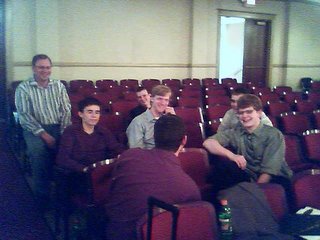
Creighton Bluejays!

Topic announcement in the beautiful chapel.

Awwww...

Nick Dudley and Chris Shaw...either they are wrestling to determine who was better now that their career is over, or...well...partners sometimes have a lot of pent up "tension."

Kevin Minch striking a "don't take my picture or I'll kill you" pose.

Kristen Owen
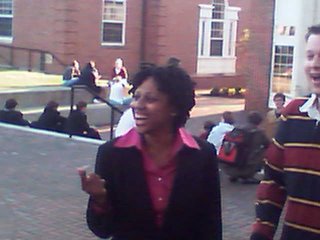
Lilia Toson

Steve Doubledee
Tuesday, September 19, 2006
Sunday, September 10, 2006
Quote of the Week
"During the summer, Republican consultants watching focus groups of married women with children, a sector that strongly supported Bush's re-election, found that the mothers often asked questions about Iraq like "Does this go on forever?" But if the women were reminded of Iraq in the context of a war on terrorism—say, by being shown a video of a plane flying into the World Trade Center—their opposition waned."
http://www.time.com/time/magazine/article/0,9171,1533382,00.html
http://www.time.com/time/magazine/article/0,9171,1533382,00.html
Thursday, September 07, 2006
Last Set of Pictures from Korea
I've been meaning to post these for a while. I feel like I haven't had a lot of time to reflect on the Korea trip, but there's not a whole lot of depth there, at least not beyond most of the things I've said in blog posts. The students were incredible, the culture was complex and beautiful, the politics (at least what I had time to see and read about) are intense, and although there's a great deal of self reflection and social criticism, the consciousness of the country seems swallowed up in consumerism and the fetishization of technology. Still, I can't wait to go back, since there was so much I didn't have the opportunity to see.

Seoul Tower. By the way, the city is not "surrounded" by mountains; rather, the mountains are all over the city. I've not really seen anything like it.


Two pictures of the fish market in Etawan. The old woman working there yelled at me for taking pictures of the dead fish.

Erma posing with an alien.

A christian street band. The guy on the right was dancing like a crazy man. I have a short video of it, but unfortunately blogger will not support it. If you want it, I can email it to you; it's hilarious. stannard [at] uwyo.edu.

Seoul Tower. By the way, the city is not "surrounded" by mountains; rather, the mountains are all over the city. I've not really seen anything like it.


Two pictures of the fish market in Etawan. The old woman working there yelled at me for taking pictures of the dead fish.

Erma posing with an alien.

A christian street band. The guy on the right was dancing like a crazy man. I have a short video of it, but unfortunately blogger will not support it. If you want it, I can email it to you; it's hilarious. stannard [at] uwyo.edu.
Sunday, August 27, 2006
"Incipient Fascist Idiot Whose Handlers Subsequently Stumble To Correct Ridiculous Statements" of the Month Award
Not that I'll necessarily bother to present this award every month, but I anticipate future months when I'll be forced to...
Katherine Harris had this to say about the necessity of electing ONLY Christians to public office in America:
Subsequently, her campaign spokesperson "clarified" Harris's remarks by saying they meant something completely contrary to what Harris had actually said:
Katherine Harris had this to say about the necessity of electing ONLY Christians to public office in America:
"If you're not electing Christians, then in essence you are going to legislate sin," Harris told interviewers from the Florida Baptist Witness, the weekly journal of the Florida Baptist State Convention. She cited abortion and same-sex marriage as examples of that sin.
Subsequently, her campaign spokesperson "clarified" Harris's remarks by saying they meant something completely contrary to what Harris had actually said:
Harris campaign spokeswoman Jennifer Marks would not answer questions about the Harris interview. Instead, she released a two-sentence statement.
"Congresswoman Harris encourages Americans from all walks of life and faith
to participate in our government," it stated. "She continues to be an
unwavering advocate of religious rights and freedoms."
Monday, August 21, 2006
Personalizing Class as Argument
Michael Yates's "Class: A Personal Story", in the July/August Monthly Review, is an excellent exercise in using personal narrative (informed by historical context) to generate a set of conclusions of concern to the anti-capitalist movement. His narrative is remarkably similar to my own, even though we are from different "cultures" geographically, religiously, etc. Below are the conclusions, but you should read about how he got there:
Yates's fine essay, along with one of my favorite essays in the blogosphere or any sphere, John Scalzi's painful and beautiful "Being Poor," form the basis of a narrative-based account of class which makes it more like, but still not exactly as such, "identity." Others can add to it, and can understand it. And it generates arguments that transcend the macro-micro narrative dichotomy, helping those of us who grew up poor understand the universality and historical context of our situations.
1. Those who would lead a mass movement must confront the fear that envelops the lives of workers. In practical terms, this means that we must engage in struggles to make life more secure. Efforts to keep intact and extend social security, disability benefits, workers’ compensation, and unemployment compensation are radical efforts. The same is true of the fight for universal, socialized health care, for the freedom and security of all immigrants, for a living wage for all workers, for an end to the doctrine of employment at will, for the right of workers to organize without employer interference, and many others. Even the environmental movement can and should be promoted in terms of human security. Working people always bear the brunt of environmental degradation and so-called natural disasters. Whatever benefits nature benefits workers. Insecurity and its attendant fear breed passivity toward authority and make it easier for the powerful to promote dissension and hatred of those who might otherwise be allies.
2. Although many have said it, let me repeat that there is no point to talk about class without making it clear that it is backward to talk about class without speaking about gender and race. We must unabashedly demand equality across all differences. We cannot tolerate restrictions on the right of women to obtain abortions. We cannot tolerate gender inequalities either at work or in the home. We cannot tolerate more than one million black men and women in prison. We must tolerate nothing less than full equality for immigrants, regardless of their legal status. If equality were the foundation of our ideology and if we succeeded in making it an accepted thing to believe in and fight for, it would surely be more difficult for employers to pit one group against another and for the state to get workers here to kill workers in other countries.
3. Workers receive a thoroughly uninspiring and mentally and physically destructive education. Struggles to expand and improve public education are, therefore, also radical struggles. The training of teachers is scandalously inadequate, and the freedom of teachers to teach critical thinking is uniformly circumscribed. Where are the teachers’ unions? Indeed, where is the labor movement? If only unions themselves took the time to educate their own members. If only the labor movement financed a network of labor radio stations, television programs, and newspapers. Working people are so misinformed and uninformed that it is no wonder governments everywhere can feed us daily doses of the most ridiculous propaganda.
4. Radical intellectuals need to stop talking to one another and actively engage the masses who alone can carry out a radical social transformation. Speak clearly. Write clearly. Seek a mass audience. And take democracy and an end to hierarchy seriously.
Yates's fine essay, along with one of my favorite essays in the blogosphere or any sphere, John Scalzi's painful and beautiful "Being Poor," form the basis of a narrative-based account of class which makes it more like, but still not exactly as such, "identity." Others can add to it, and can understand it. And it generates arguments that transcend the macro-micro narrative dichotomy, helping those of us who grew up poor understand the universality and historical context of our situations.
Saturday, August 05, 2006
North Korea and the Demilitarized Zone
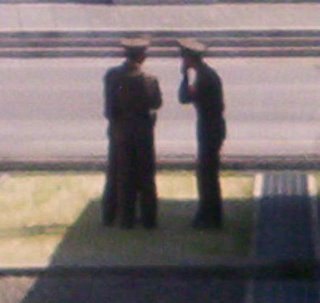
Well, I've officially walked into North Korea and taken pictures of North Korean soldiers and cities. After taking the highly-regulated but very comprehensive USO DMZ tour, I am exhausted and filled with wonder over the way that geopolitics, history, and propaganda have split a people in half.
As astounding as the sites were, the tour guides were alternatively funny and a little odd. Our Korean guide, pictured below, is the Lawrence Welk of DMZ tour guides (that was my name for him, not some official designation). One of our companions simply referred to him as "a dandy," and that he was! He would say things like "What do you think of ginseng chicken, eh? Perhaps you will eat some...perhaps you will eat some tonight. Yes? Yes, I think you will." And this in the middle of what he kept referring to as "the most dangerous place on earth," all the while smiling smugly (or seductively). He was much more entertaining than the American soldier who took us through Panmunjeom and seemed incredibly amused with his own self-perceived studliness and occasional subtle racist jokes about North Koreans.
The trip through the Third Infiltration Tunnel was comparable to some of the toughest hiking I'd ever done, but definitely worth it. The entire tour was a combination of the harsh reality of "peacetime war" and the ineradicable cheerfulness of Korean tours. But at least I got to walk into North Korea for a few minutes. It was definitely a once-in-a-lifetime experience.

Our tour guide, AKA Lawrence Welk, Korean-style.
Below are three shots of North Korean soldiers in Panmunjeom. They were taking a bunch of pictures of us as we were taking a bunch of pictures of them.

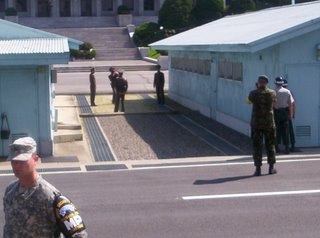
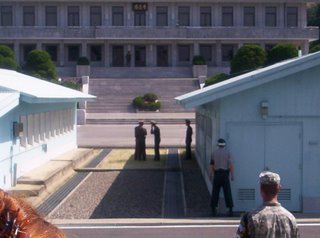
Charming bunch, really. They seemed genuinely excited to see us...
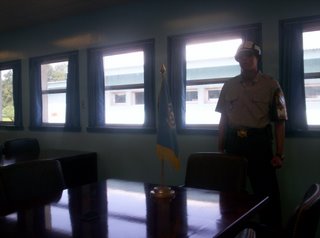
The building in Panmunjeom where peace negotiations were held in 1953, and where communication occasionally takes place now. I am taking a picture of the South Korean side from the North Korean side.


Kijong-dong "propaganda village" in North Korea. We were told that only soldiers live in the city.

North Korean guard tower.

A monument to the 1976 Poplar Tree Axe Murder incident, which nearly triggered a second round of the Korean War.

The Bridge of No Return

Portion of the Southern Demarcation Line. I was constantly amazed at how close we were to everything.
Below are photos of a sculpture whose meaning is obvious. The close-up shots reveal a lot of personality in the faces. I enjoyed walking around this and investigating its characters.
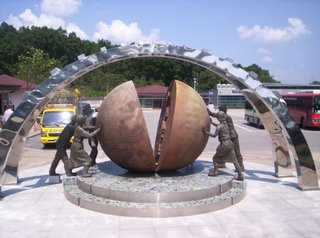



The old man is especially compelling.
Finally, no tour in Korea (including, apparently, of the DMZ) would be complete without cheesy cartoonish characters. This is a theater near the Third Infiltration Tunnel. The movie was a 10-minute long South Korean propaganda effort that left my companions and me wondering which side of the border we were really on.

Asian Parliamentary Debate
Thursday, August 03, 2006
Neocons for Middle East War, Against Rice
This Sidney Blumenthal article is pretty provocative. Read the whole thing at Salon; I have just snipped a few gems below. If it's true, it ought to give Bush apologists pause...or perhaps a stomach ache. And Condi Rice has been marginalized by the neocons. She just isn't hawkish and machiavellian enough for them, I guess (or maybe she reminds them too much of Powell? Kind of a "they all look alike to us" syndrome maybe?)...
...
...
By secretly providing NSA intelligence to Israel and undermining the hapless Condi Rice, hardliners in the Bush administration are trying to widen the Middle East conflict to Iran and Syria, not stop it.
...
Secretary of State Condoleezza Rice is said to have been "briefed" and to be "on board," but she is not a central actor in pushing the covert neoconservative scenario. Her "briefing" appears to be an aspect of an internal struggle to intimidate and marginalize her. Recently she has come under fire from prominent neoconservatives who oppose her support for diplomatic negotiations with Iran to prevent its development of nuclear weaponry.
...
Despite Rice's shunning of the advice of the Bush I sages, the neoconservatives have made her a convenient target in their effort to undermine all diplomatic initiatives. "Dump Condi," read the headline in the right-wing Insight Magazine on July 25. "Conservative national security allies of President Bush are in revolt against Secretary of State Condoleezza Rice, saying that she is incompetent and has reversed the administration's national security and foreign policy agenda," the article reported.
Sunday, July 30, 2006
Critical Korean Art
Yesterday, Meg Rithmire and I visited the National Museum of Contemporary Art. I was deeply impressed by the depth, intellect and emotion of many of the pieces I saw. From criticism of globalization, capitalism, colonialism and Korea's consumer culture, to the struggle to define Korean identity, to sex and gender issues, to Korean's struggle to come to terms with their divided nation, this was some of the best political and historical art I had ever seen.
I'll have more to say later on some of the exhibits inside the museum (the website is very easy to navigate and will show you much of this art). Here are the fantastic sculptures outside. Even if you aren't a great art interpreter, much of this stuff speaks for itself (one small clarification--the figure in the first photo is assuming the exact same position as the guards on the border at the Demilitarized Zone):
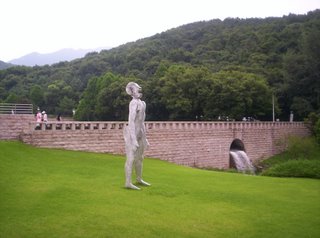

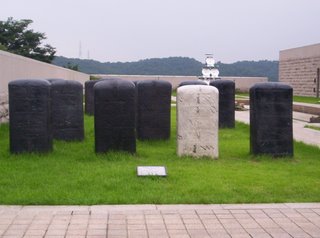
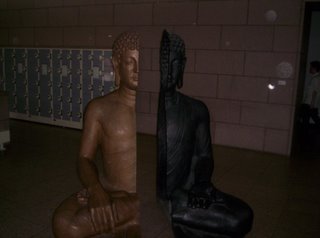
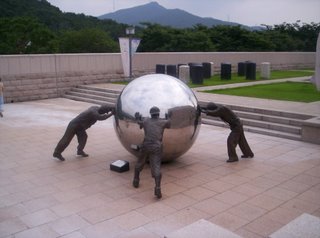
(my personal favorite)
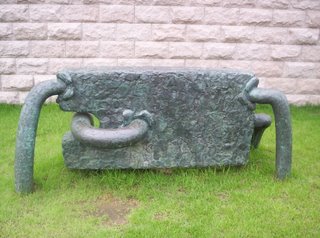

I'll have more to say later on some of the exhibits inside the museum (the website is very easy to navigate and will show you much of this art). Here are the fantastic sculptures outside. Even if you aren't a great art interpreter, much of this stuff speaks for itself (one small clarification--the figure in the first photo is assuming the exact same position as the guards on the border at the Demilitarized Zone):





(my personal favorite)


Subscribe to:
Comments (Atom)









